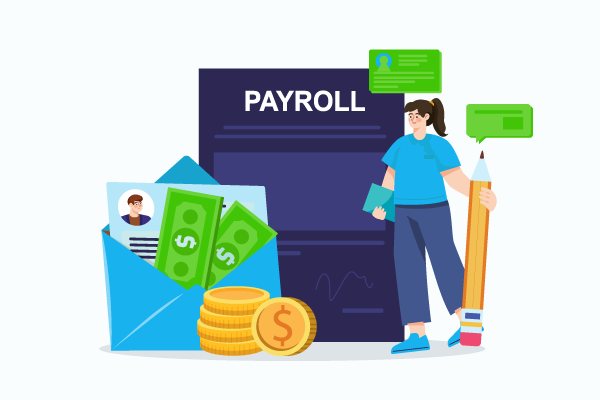What Is Payroll?
As a Florida employee or business owner, have you ever asked yourself: What is payroll? It’s the magical process that makes sure everyone gets paid on time and all taxes are taken care of—and if it weren’t for bi-monthly (or weekly!) runs through the system, chaos would ensue!
But do you know how it works? Don’t worry, that’s what I’m here to help with today. Let me dazzle your eyebrows off with knowledge about payroll and everything related to making sure money ends up in the right hands.
Payroll includes a variety of processes to keep track of, including salary calculation, employee deductions, employer taxes and other forms of compensation.
It also includes tracking employees’ time worked or hours scheduled each week to ensure accurate payments are made. This data is then processed through payroll software or an outsourced service for generating the appropriate checks and reports.
To ensure that payroll is accurate and up-to-date, companies must take into account changing regulations and laws, particularly when dealing with employee benefits.
Additionally, organizations need to be sure they are complying with state and federal tax laws.
How Often is Payroll Processed?
Payroll is usually processed every two weeks, although some companies process payroll weekly or even monthly.
It’s important to note that the frequency of payroll processing will depend on an organization’s specific guidelines and policies.
Employee Deductions
In addition to ensuring accurate payment for hours worked, payroll processes also include deductions for tax withholdings and contributions to benefit plans.
Employers are responsible for collecting employee contributions and remitting them to the appropriate agencies or institutions.
It is also important to remember that these deductions must be done in accordance with applicable laws and regulations, as well as any collective bargaining agreements.
Companies should stay up-to-date on changing laws and regulations regarding payroll deductions to ensure compliance at all times.
Payroll Distribution
Once deductions have been completed and the net pay has been calculated, it’s time to distribute payroll to employees. This can be done in a variety of ways including direct deposit, physical checks, or through an online payment system.
In some cases, organizations may also choose to provide their employees with physical cards, such as debit cards, for receiving their wages.
Regardless of the method chosen, it’s important to remember that employees should receive timely payment for the work they have done and are entitled to be paid in accordance with applicable laws and regulations.
Employers also have a responsibility to ensure all employee information is kept secure when transferring payroll funds.
What Are The Consequences of Not Paying Employees on Time?
If employers fail to provide payroll on time, they may face serious financial and legal consequences.
On the financial side, late or missing payments can lead to disruption in cash flow for employees who rely on their wages to pay bills or buy food. In addition, organizations that are consistently late in paying their employees may experience higher turnover rates and employee dissatisfaction.
On the legal side, employers who do not pay employees on time may be subject to penalties and fees. Depending on the jurisdiction, employers can be required to pay back wages, interest on unpaid wages, or even punitive damages.
In extreme situations, they may also face criminal charges if they are found to have willfully violated wage and labor laws.
It is important for employers to create and maintain reliable payment systems. An automated payroll system can help organizations manage payments more accurately and efficiently.
Additionally, it is also critical to provide employees with clear information about the company’s payment policies so that they know when their wages will be paid.
By taking proactive steps to ensure timely payments, employers can avoid penalties and create a better working environment for their employees.
It is also essential to stay abreast of changing laws and regulations so that employers can comply with the latest requirements.
Employers should regularly review their policies to make sure they are up-to-date and compliant with all applicable laws and regulations.
How Can I Ensure That My Employees Are Paid on Time?
By implementing a system that tracks payments accurately and efficiently, employers can ensure employees are paid on time.
Organizations should also create programs that clearly outline when and how employees’ salaries will be paid. Additionally, employers should make sure to stay up-to-date with changes in the law by regularly reviewing their payment policies.
Another thing – employers should use tools such as payroll and accounting software to keep track of payments and ensure that employees are paid on time. This will help employers stay organized and compliant while still providing a fair salary for their employees.
Employers should also communicate regularly with their employees regarding any changes to payment policies or procedures. This can help prevent confusion and frustration among staff, and ensure that employees understand their rights.
Additionally, employers should consider offering training to employees about payroll processes so that everyone is on the same page. Finally, employers should provide clear information on any deductions taken from paychecks for taxes or other withholdings.
This will help employees understand where their money is going and why they may not be receiving their full paycheck. With clear information, employees can be better informed and more satisfied with their working conditions.
What Are Some of the Best Payroll Tips and Tricks?
1- Automate as much of the payroll processes as possible, including payment scheduling and deductions to ensure accuracy and efficiency.
2- Utilize software or other online tools to provide real-time updates on payments, deductions, and more.
3- Ensure that employees receive their paychecks in a timely manner without any delays or discrepancies.
4-Develop a policy for handling any issues or disputes that may arise with payroll processing and payments.
5- Offer training to employees about payroll procedures and processes so everyone is up-to-date on the latest changes.
Use tax withholding tables to accurately calculate federal, state, local, and other taxes from each paycheck.
As we saw, payroll is a vital but often complicated process for businesses of all sizes.
If you’re feeling overwhelmed by the details or just don’t have the time to handle it yourself, consider partnering with PEOPAYGO.
We can take care of all your HR and payroll needs so that you can focus on running your business. Do you outsource your payroll? Let us know in the comments below!




